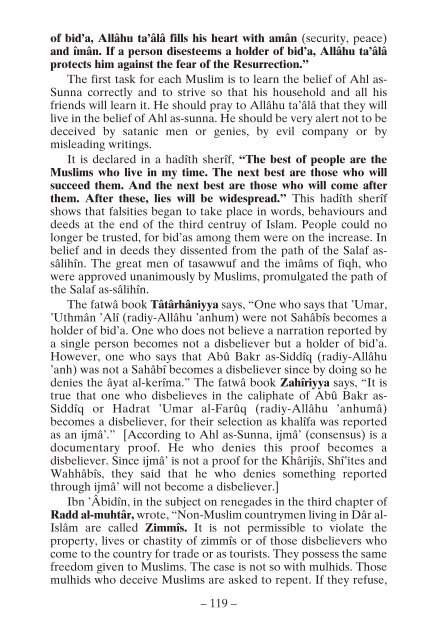Answer to an Enemy of Islam
Answer to an Enemy of Islam This is a refutation of the lies and slanders which the lâ-madhhabî Rashîd Rıdâ of Egypt, who appeared in the disguise of a religious man and wrote against the scholars of Islam in his book Muhâwarât.
Answer to an Enemy of Islam
This is a refutation of the lies and slanders which the lâ-madhhabî Rashîd Rıdâ of Egypt, who appeared in the disguise of a religious man and wrote against the scholars of Islam in his book Muhâwarât.
You also want an ePaper? Increase the reach of your titles
YUMPU automatically turns print PDFs into web optimized ePapers that Google loves.
<strong>of</strong> bid’a, Allâhu ta’âlâ fills his heart with amân (security, peace)<br />
<strong>an</strong>d îmân. If a person disesteems a holder <strong>of</strong> bid’a, Allâhu ta’âlâ<br />
protects him against the fear <strong>of</strong> the Resurrection.”<br />
The first task for each Muslim is <strong>to</strong> learn the belief <strong>of</strong> Ahl as-<br />
Sunna correctly <strong>an</strong>d <strong>to</strong> strive so that his household <strong>an</strong>d all his<br />
friends will learn it. He should pray <strong>to</strong> Allâhu ta’âlâ that they will<br />
live in the belief <strong>of</strong> Ahl as-sunna. He should be very alert not <strong>to</strong> be<br />
deceived by sat<strong>an</strong>ic men or genies, by evil comp<strong>an</strong>y or by<br />
misleading writings.<br />
It is declared in a hadîth sherîf, “The best <strong>of</strong> people are the<br />
Muslims who live in my time. The next best are those who will<br />
succeed them. And the next best are those who will come after<br />
them. After these, lies will be widespread.” This hadîth sherîf<br />
shows that falsities beg<strong>an</strong> <strong>to</strong> take place in words, behaviours <strong>an</strong>d<br />
deeds at the end <strong>of</strong> the third centruy <strong>of</strong> <strong>Islam</strong>. People could no<br />
longer be trusted, for bid’as among them were on the increase. In<br />
belief <strong>an</strong>d in deeds they dissented from the path <strong>of</strong> the Salaf assâlihîn.<br />
The great men <strong>of</strong> tasawwuf <strong>an</strong>d the imâms <strong>of</strong> fiqh, who<br />
were approved un<strong>an</strong>imously by Muslims, promulgated the path <strong>of</strong><br />
the Salaf as-sâlihîn.<br />
The fatwâ book Tâtârhâniyya says, “One who says that ’Umar,<br />
’Uthmân ’Alî (radiy-Allâhu ’<strong>an</strong>hum) were not Sahâbîs becomes a<br />
holder <strong>of</strong> bid’a. One who does not believe a narration reported by<br />
a single person becomes not a disbeliever but a holder <strong>of</strong> bid’a.<br />
However, one who says that Abû Bakr as-Siddîq (radiy-Allâhu<br />
’<strong>an</strong>h) was not a Sahâbî becomes a disbeliever since by doing so he<br />
denies the âyat al-kerîma.” The fatwâ book Zahîriyya says, “It is<br />
true that one who disbelieves in the caliphate <strong>of</strong> Abû Bakr as-<br />
Siddîq or Hadrat ’Umar al-Farûq (radiy-Allâhu ’<strong>an</strong>humâ)<br />
becomes a disbeliever, for their selection as khalîfa was reported<br />
as <strong>an</strong> ijmâ’.” [According <strong>to</strong> Ahl as-Sunna, ijmâ’ (consensus) is a<br />
documentary pro<strong>of</strong>. He who denies this pro<strong>of</strong> becomes a<br />
disbeliever. Since ijmâ’ is not a pro<strong>of</strong> for the Khârijîs, Shî’ites <strong>an</strong>d<br />
Wahhâbîs, they said that he who denies something reported<br />
through ijmâ’ will not become a disbeliever.]<br />
Ibn ’Âbidîn, in the subject on renegades in the third chapter <strong>of</strong><br />
Radd al-muhtâr, wrote, “Non-Muslim countrymen living in Dâr al-<br />
Islâm are called Zimmîs. It is not permissible <strong>to</strong> violate the<br />
property, lives or chastity <strong>of</strong> zimmîs or <strong>of</strong> those disbelievers who<br />
come <strong>to</strong> the country for trade or as <strong>to</strong>urists. They possess the same<br />
freedom given <strong>to</strong> Muslims. The case is not so with mulhids. Those<br />
mulhids who deceive Muslims are asked <strong>to</strong> repent. If they refuse,<br />
– 119 –

















